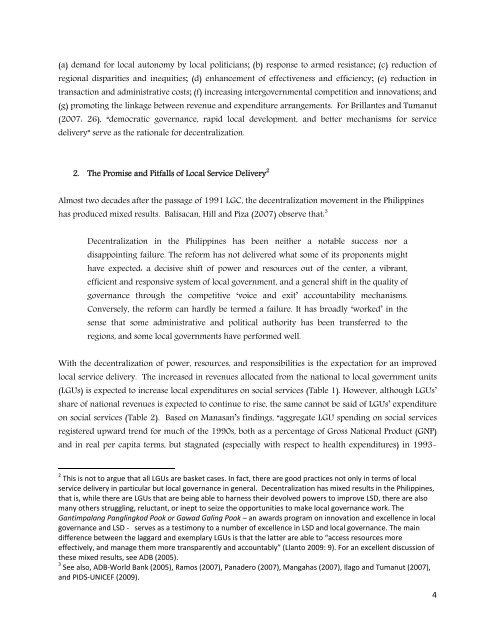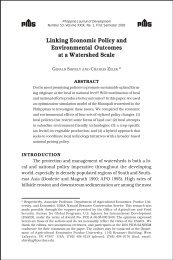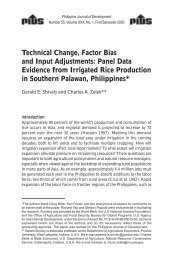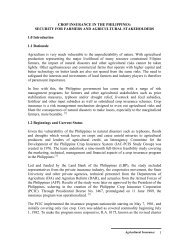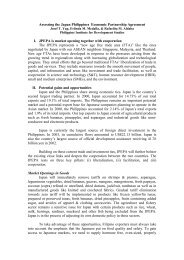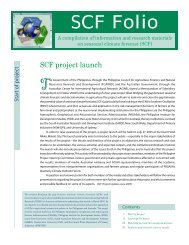Triangulation Framework for Local Service Delivery - Philippine ...
Triangulation Framework for Local Service Delivery - Philippine ...
Triangulation Framework for Local Service Delivery - Philippine ...
You also want an ePaper? Increase the reach of your titles
YUMPU automatically turns print PDFs into web optimized ePapers that Google loves.
(a) demand <strong>for</strong> local autonomy by local politicians; (b) response to armed resistance; (c) reduction of<br />
regional disparities and inequities; (d) enhancement of effectiveness and efficiency; (e) reduction in<br />
transaction and administrative costs; (f) increasing intergovernmental competition and innovations; and<br />
(g) promoting the linkage between revenue and expenditure arrangements. For Brillantes and Tumanut<br />
(2007: 26), “democratic governance, rapid local development, and better mechanisms <strong>for</strong> service<br />
delivery” serve as the rationale <strong>for</strong> decentralization.<br />
2. The Promise and Pitfalls of <strong>Local</strong> <strong>Service</strong> <strong>Delivery</strong> 2<br />
Almost two decades after the passage of 1991 LGC, the decentralization movement in the <strong>Philippine</strong>s<br />
has produced mixed results. Balisacan, Hill and Piza (2007) observe that: 3<br />
Decentralization in the <strong>Philippine</strong>s has been neither a notable success nor a<br />
disappointing failure. The re<strong>for</strong>m has not delivered what some of its proponents might<br />
have expected: a decisive shift of power and resources out of the center, a vibrant,<br />
efficient and responsive system of local government, and a general shift in the quality of<br />
governance through the competitive ‘voice and exit’ accountability mechanisms.<br />
Conversely, the re<strong>for</strong>m can hardly be termed a failure. It has broadly ‘worked’ in the<br />
sense that some administrative and political authority has been transferred to the<br />
regions, and some local governments have per<strong>for</strong>med well.<br />
With the decentralization of power, resources, and responsibilities is the expectation <strong>for</strong> an improved<br />
local service delivery. The increased in revenues allocated from the national to local government units<br />
(LGUs) is expected to increase local expenditures on social services (Table 1). However, although LGUs’<br />
share of national revenues is expected to continue to rise, the same cannot be said of LGUs’ expenditure<br />
on social services (Table 2). Based on Manasan’s findings, “aggregate LGU spending on social services<br />
registered upward trend <strong>for</strong> much of the 1990s, both as a percentage of Gross National Product (GNP)<br />
and in real per capita terms, but stagnated (especially with respect to health expenditures) in 1993-<br />
2 This is not to argue that all LGUs are basket cases. In fact, there are good practices not only in terms of local<br />
service delivery in particular but local governance in general. Decentralization has mixed results in the <strong>Philippine</strong>s,<br />
that is, while there are LGUs that are being able to harness their devolved powers to improve LSD, there are also<br />
many others struggling, reluctant, or inept to seize the opportunities to make local governance work. The<br />
Gantimpalang Panglingkod Pook or Gawad Galing Pook – an awards program on innovation and excellence in local<br />
governance and LSD ‐ serves as a testimony to a number of excellence in LSD and local governance. The main<br />
difference between the laggard and exemplary LGUs is that the latter are able to “access resources more<br />
effectively, and manage them more transparently and accountably” (Llanto 2009: 9). For an excellent discussion of<br />
these mixed results, see ADB (2005).<br />
3 See also, ADB‐World Bank (2005), Ramos (2007), Panadero (2007), Mangahas (2007), Ilago and Tumanut (2007),<br />
and PIDS‐UNICEF (2009).<br />
4


